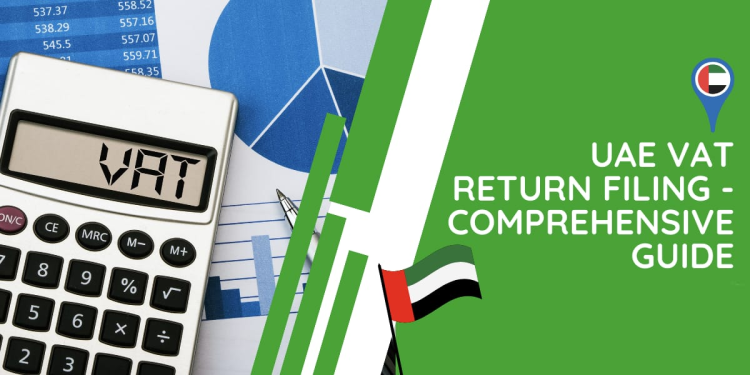UAE VAT Compliance Made Easy: Filing Returns and Steering Clear of Penalties
Master UAE VAT compliance with this detailed checklist. Learn how to meet VAT compliance requirements, file returns accurately, and avoid penalties for your business in the UAE.

Operating a business in the UAE demands precision in navigating its tax landscape, and UAE VAT compliance stands as a cornerstone of financial responsibility. Since the introduction of Value Added Tax (VAT) on January 1, 2018, businesses have faced the challenge of meeting VAT compliance requirements to ensure smooth operations. Failing to file returns correctly or missing deadlines can lead to hefty penalties, draining resources, and damaging credibility. A thorough VAT compliance check can make all the difference, helping you stay aligned with the Federal Tax Authority (FTA).
This guide provides a detailed UAE VAT compliance checklist to streamline your processes, ensure accurate filings, and protect your business from fines. Whether you’re a startup in Dubai’s bustling markets or a multinational in Abu Dhabi, these steps will help you meet VAT compliance requirements confidently. Let’s explore how to master compliance in 2025.
What Is VAT and Why Does Compliance Matter?
VAT in the UAE is a 5% tax applied to most goods and services, with exemptions for sectors like education and healthcare. Businesses exceeding specific turnover thresholds must register, collect VAT, and remit it to the FTA. UAE VAT compliance goes beyond paying taxes; it involves maintaining accurate records, issuing proper invoices, and meeting filing deadlines. A robust VAT compliance check ensures you avoid errors that could trigger penalties, which range from AED 1,000 for late filings to AED 20,000 for delayed registration.
For a small business, such as a café in Al Ain, these fines can disrupt cash flow. Larger firms risk audits that could harm their reputation. By prioritizing VAT compliance requirements, you safeguard your operations and build trust with stakeholders.
Determining Your VAT Registration Obligations
A critical first step in UAE VAT compliance is understanding whether your business needs to register. The FTA outlines clear thresholds:
-
Mandatory Registration: Required if taxable supplies or imports exceed AED 375,000 over the past 12 months or are expected to in the next 30 days.
-
Voluntary Registration: Businesses with turnovers between AED 187,500 and AED 375,000 can register to reclaim input VAT.
-
Non-Residents: Foreign entities supplying taxable goods or services in the UAE must register if no one else accounts for the tax.
For example, a Dubai-based e-commerce store earning AED 400,000 annually must register within 30 days to meet VAT compliance requirements. A freelance designer with AED 200,000 in turnover might opt for voluntary registration to recover VAT on business expenses. Failing to register on time incurs a AED 20,000 penalty, making an early VAT compliance check essential.
How to Register for VAT Correctly
Meeting VAT compliance requirements starts with proper registration. Follow these steps:
-
Access EmaraTax: Use the FTA’s portal at eservices.tax.gov.ae.
-
Gather Documents: Prepare your trade license, Emirates ID, passport copies, and turnover records.
-
Submit Application: Complete the online form with your Tax Registration Number (TRN) details.
-
Non-Resident Requirements: Appoint a local fiscal representative if operating from outside the UAE.
Upon approval, you’ll receive a TRN, which must appear on all VAT-related documents. A logistics company in Jebel Ali, for instance, needs its TRN on every invoice to pass a VAT compliance check during audits.
Keeping Accurate Records for VAT Compliance
A robust VAT compliance check hinges on meticulous record-keeping. The FTA requires businesses to retain records for five years, including:
-
Sales and purchase invoices.
-
Credit notes, debit notes, and receipts.
-
Financial statements and bank reconciliations.
-
Customs documents for imports and exports.
A retail shop in Dubai’s Deira district, for example, must track VAT on sales and input VAT on inventory. Using accounting software can streamline this process, reducing errors. Failing to maintain records can lead to an AED 10,000 fine for the first offense, escalating to AED 50,000 for repeat violations, underscoring the importance of VAT compliance requirements.
Filing VAT Returns: A Clear Process
Filing VAT returns is a core component of UAE VAT compliance. Most businesses file quarterly, while those with turnovers above AED 150 million file monthly. Returns are due within 28 days of the tax period’s end. Here’s how to file:
-
Log in to EmaraTax: Access the VAT 201 form with your credentials.
-
Compile Data: Gather details of output VAT (sales), input VAT (purchases), and net VAT owed.
-
Complete and Verify: Enter taxable, zero-rated, and exempt supplies accurately.
-
Submit and Pay: File the return and settle any VAT due by the deadline.
For instance, a consultancy with AED 600,000 in quarterly sales and AED 30,000 in output VAT, offset by AED 25,000 in input VAT, owes AED 5,000. Missing the deadline triggers a AED 1,000 fine for the first offense, doubling for repeats. A VAT compliance check before submission can prevent such issues.
Issuing Tax Invoices That Meet FTA Standards
Every taxable supply requires a compliant tax invoice, issued within 14 days. Key elements include:
-
Sequential invoice number.
-
TRN of the supplier and the recipient.
-
Description of goods/services, unit price, and VAT rate.
-
Total VAT amount in AED.
A software firm in Dubai Internet City must ensure invoices reflect the 5% VAT rate and include all required details. Non-compliant invoices attract an AED 5,000 penalty per instance, making a VAT compliance check critical for invoicing processes.
Common Mistakes and How to Avoid Them
Errors in UAE VAT compliance can lead to penalties. Common pitfalls include:
-
Delayed Registration: Track turnover monthly to register on time.
-
Calculation Errors: Use software to ensure accurate VAT computations.
-
Incomplete Records: Conduct quarterly reviews to verify documentation.
-
Missed Deadlines: Set reminders for filing and payment dates.
A construction firm misclassifying expenses might face an AED 3,000 fine for incorrect filings. Regular VAT compliance checks can catch these errors early, ensuring adherence to VAT compliance requirements.
Correcting Errors in Filed Returns
If you identify an error in a VAT return, address it promptly. For errors under AED 10,000, adjust in the next return. For larger errors, file a voluntary disclosure using Form 211 within 20 days. Penalties for disclosures start at AED 1,000, but quick action minimizes further risks. A trading company discovering an AED 12,000 overpayment can use Form 211 to correct it, avoiding audit penalties.
Understanding Penalties for Non-Compliance
The FTA enforces strict penalties to uphold UAE VAT compliance:
-
Late Registration: AED 20,000.
-
Late Filing: AED 1,000 (first offense), AED 2,000 (repeat).
-
Late Payment: 2% immediately, plus 4% monthly, up to 300% of unpaid VAT.
-
Incorrect Invoicing: AED 5,000 per invoice.
-
Record-Keeping Failures: AED 10,000 (first offense), AED 50,000 (repeat).
A manufacturing business missing multiple deadlines could face fines exceeding AED 50,000. Regular VAT compliance checks help avoid these costly errors.
Best Practices to Simplify VAT Compliance
Streamline UAE VAT compliance with these strategies:
-
Use Technology: Adopt VAT-compliant software for accurate calculations.
-
Regular Audits: Schedule quarterly reviews to ensure compliance.
-
Staff Training: Educate your team on VAT compliance requirements.
-
Seek Expert Guidance: Consult professionals for complex transactions.
An e-commerce business in Dubai, for example, can use software to track zero-rated exports, ensuring compliance during a VAT compliance check.
Why Compliance Benefits Your Business
Beyond avoiding fines, meeting VAT compliance requirements strengthens your operations. Accurate filings enhance credibility with banks, while claiming input VAT reduces costs. A logistics firm recovering VAT on fuel expenses might save thousands annually, freeing up capital for growth. Compliance also prepares you for FTA audits, minimizing disruptions.
Preparing for 2025 VAT Updates
In 2025, anticipate stricter e-invoicing rules for B2B and B2G transactions, effective July 2026 for larger firms. Staying updated via FTA announcements and conducting regular VAT compliance checks ensures readiness for these changes.
Conclusion
Achieving UAE VAT compliance is vital for businesses aiming to succeed in the UAE’s competitive market. By following this checklist, registering on time, maintaining accurate records, and filing returns correctly, you can avoid penalties and focus on growth. At Dubai Business and Tax Advisors, we specialize in guiding businesses through VAT compliance requirements, offering tailored solutions to keep your operations seamless and penalty-free. Let us support your journey to compliance and success.
What's Your Reaction?






























